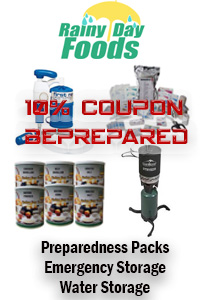I recently read an article posted on another website which claimed that one should not rely on bartering after SHTF, or an economic collapse. Without divulging the source of the article (professional courtesy) I would like to address why I believe this concept is flawed and why after an economic collapse or SHTF type event bartering will be absolutely essential to survival. In order to establish a base line for my rebuttal to his assumption that “bartering is overrated” I should first list out some of the arguments the author made to support his rationale. For the sake of simplicity I will do my best to paraphrase a few that I found interesting.
- Bartering assumes you have goods to spare. Since the next economic collapse will take years to evolve, it is conceivable that one would simply run out of goods during this period, or be so concerned with conservation that bartering would not even be an option.
- If the grid goes down there will be full fledged WROL and anarchy. Any attempt to barter with neighbors or outsiders will only expose others (word of mouth) to the fact that you have supplies, and people will then attempt to rob you.
- Bartering is too risky, you might have to leave your retreat location to conduct transactions. In addition to letting others know what you might have (compromise OPSEC), this could also open you up to potential ambushes. Instead one should remain at the retreat and focus on pulling security.
- Bartering is too time consuming. You might have to interact with 100 people before you find the item that you need.
Before I continue I would ask what you think of his arguments? Take a minute to formulate your own responses if you disagree (or even agree) with what he wrote. While there are some elements of truth in what he writes I would submit that the overall logic is flawed. After SHTF it is true that resources will be tight, no matter how well stocked any of us are. There might not be any trips down to the local grocery, swiping of debit cards and coming back to the house with an SUV full of food. Instead of addressing each of his points individually I can think of one word which provides the solution to all of those “problems.” The word is simple but the concept is powerful: Community.
In an extended post SHTF collapse there will be no such thing as one man armies, there will be no such thing as a single family which hunkers down by themselves surviving alone on their food stores. If the grid goes down during this time (and it is entirely possibly considering how fragile it is) even the most fortified home will not be able to withstand a determined group of well trained individuals. The solution to all of this is community. Instead of fearing what the author listed in his article you should incorporate all of those topics into your survival plan and use the concept of community to mitigate many of the potential risks.
You will not be able to hide the fact that you have extra food and supplies from your neighbors post collapse, it will be impossible. Communities come together during adversity and 1 to 2 months after SHTF people will be wondering why they are practically starving and you and your family are not. What are you going to do, tell them if they step one foot on your property you’ll shoot them all? Not a smart plan and quite frankly one that is doomed (remember these are your neighbors, not outsiders). Desperate people are capable of extraordinary things, and while you might get a few of them they would rather see your home burn to the ground versus you having food while they all starve. Instead use the food you have as an advantage, a bargaining chip (read: barter) which will help everyone in your community. You have food, they have strength in numbers. How about you supply some food for those who are willing to help pull security for the neighborhood. Those who are willing to go out on other bartering runs or food collection missions will receive extra rations. By being willing to share your food in exchange for services, you will be in a position of power within your community. Additionally everyone working together with a common goal in mind (survival) will greatly enhance everyone’s survivability rate. Keep in mind no plan is perfect and there is always the chance that you might have an unreasonable neighbor who would still demand confiscating all of your goods, or taking it by force. If this happens you must reiterate that you are willing to share but any threats to your family or stash will not be tolerated and will be dealt with swiftly. This is no time to waffle or be wishy-washy.
Bartering will be an absolutely essential part of survival after a major collapse. While there are many risks associated with the bartering process, many of those risks can be mitigated through the forming of trusted communities. It should also be noted that bartering does not only apply to goods, bartering services should be taken into consideration as well. I don’t know of a single person who is a qualified surgeon, mechanic, pilot, welder, sailor, veterinarian, and farmer….all with experience in military special operations. Therefore it only stands to reason that people will need to exchange goods and services in order to survive. Consider your plan, embrace your community and your chances of making it through SHTF will be much greater than the lone wolf who believes they can do it all alone.









8 comments
Skip to comment form
I believe I read the article you are referring to and pretty much had the same reaction. I will take my chances and try to cover as many bases as possible. If I’m buying lighters for my preps, why not buy ages extra for barter? It only makes sense and in most cases costs very little. This can be applied to all aspects of the preps and is simply one more little insurance policy I have for survival.
Author
Totally agree. I think anyone who has read the Mac Slavo article on SHTF survival in Bosnia is heaving stocked on lighters and hand sanitizer.
Bartering already exists all over the US! I have traded goods and services for other goods and services ever since I was a teenager. Bartering doesnt mean setting up a stall at an impromptu SHTF farmer’s market. It just means trading that extra spool of wire you bought on Black Friday at Home Depot for a bucket of tomatoes that old lady at the end of your road grew. PJ, you are on track and hope all the other readers are on the same track!
Other good barter items: cold weather clothing (stock up at the Goodwill), matches, water jugs, small sewing kits, alcohol (drinking and rubbing), and pretty much anything else you can get from Dollar General.
I have to agree that bartering will be a major part in a desaster, even a natural desaster such as flood or earthquake. Look at the resent Sandy event, people would pretty much trade anything for an extra blanket or a few cans of food or fuel. Not sure why alot of people think that in a major event such as no power for months will result in total anarchy. I have a bit more faith in my fellow man not to go and shoot someone for a can of food or a blanket when they can simply ask first or maybe offer up a trade.
Side note: Go to a fabric store and get bolts of clothing and blanket material when it’s on sale or a discontinued pattern. I found you can buy enough blanket material for 10 people for the same price you can get one blanket at wal-mart or some other store. So what if it’s not nice and pretty if it can keep you warm.
Author
Eric great point about the fabric store and the material available there. I will have to remember that, sounds like you are a thrifty shopper.
i think that you are referring to 1 on 1 trading rather than bartering because I’ve seen those kinds of post and i think there talking about bartering areas people make with tons of people…that’s why their saying its going to take time, dangerous, etc.
When the shtf , not if ! i dont see that bartering will work because there will be alot of people with out nothing , but they have a gun etc ? , so they will take what they want in the real world . The outlook would not be good for a very long time, I would prep for at least 5 years keep my head down ! and as for police and army keep away from them as they work for the people who got us into the mess in the first place ???. I have seen that some prepper sites say that law and order will get back to normal , this may not be for years? 100+ or more .
One of the problems with a community-based approach to a SHTF situation is that there are too many people who think they are (or should be) entitled to more and/or better than others! My personal example is a lawyer that I did some drywall work in his garage; he wanted to me to trade my labor for his legal services, sounded good until I got full details. He felt his time was worth $200 per hour and mine was only worth $10 per hour so I would have to work for him for 20 hours to get one hour of his ‘work’, no thank you! Another example is the person(s) that make a good living pre-SHTF with a ‘skill’ (like banking) that will have little to no use/value after a SHTF situation, but he/she is not only used to a good, easy life style but they may have several children to care for. They would probably be little more than a drain on the resources of a community, but some members of that community may want to support them anyway (at least initially) and others won’t; internal strife is sure to follow. Charity is easy when you have plenty but when that closet/room full of supplies starts to get empty and your neighbors still want more? How many people (especially in urban areas) are fully dependent on the government to provide them with a living; many jobs will no longer have any value? That said, I will still be willing to help support my family but there will have to be trade offs! One thing a community would need to establish quickly is sanitation. Toilets probably won’t be flushing for very long and that water that is available would undoubtable be better used as drinking water. Outhouses would need to be set up quickly for the entire community in several locations, this is where I would suggest that paper towels be stocked up instead of toilet paper; PT have many more uses than TP, and being much sturdier, less is needed to ‘do the paperwork’. Also, this is an area where large bottles of hand sanitizer (with pump handles) would be needed; not small bottles that people would probably take with them back home. These outhouses should have a easy-to-use system for dumping excavated dirt on top of their bodily wastes to cover and reduce the smell (and flies). Also, insulate the walls and roof so that people won’t dread using them in the winter (a freezing wooden box is no fun); making provisions to remove the insulation from the ceiling during warm/hot weather so the smell won’t be as bad and it won’t be a hot box. Maybe a scented candle would help make use of an outhouse less of a bad experience. GLAHP!